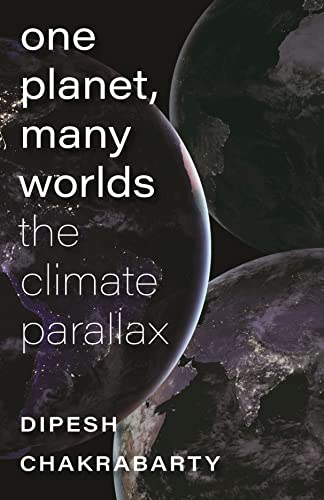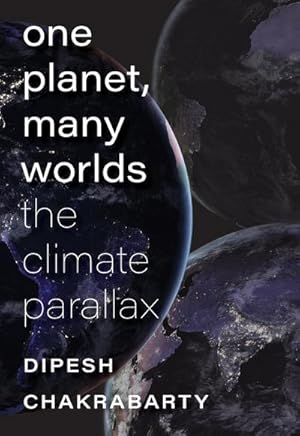planet worlds climate parallax di chakrabarty dipesh (26 risultati)
Filtri di ricerca
Tipo di articolo
- Tutti i tipi di prodotto
- Libri (26)
- Riviste e Giornali (Nessun altro risultato corrispondente a questo perfezionamento)
- Fumetti (Nessun altro risultato corrispondente a questo perfezionamento)
- Spartiti (Nessun altro risultato corrispondente a questo perfezionamento)
- Arte, Stampe e Poster (Nessun altro risultato corrispondente a questo perfezionamento)
- Fotografie (Nessun altro risultato corrispondente a questo perfezionamento)
- Mappe (Nessun altro risultato corrispondente a questo perfezionamento)
- Manoscritti e Collezionismo cartaceo (Nessun altro risultato corrispondente a questo perfezionamento)
Condizioni Maggiori informazioni
- Nuovo (24)
- Come nuovo, Ottimo o Quasi ottimo (2)
- Molto buono o Buono (Nessun altro risultato corrispondente a questo perfezionamento)
- Discreto o Mediocre (Nessun altro risultato corrispondente a questo perfezionamento)
- Come descritto (Nessun altro risultato corrispondente a questo perfezionamento)
Legatura
Ulteriori caratteristiche
- Prima ed. (Nessun altro risultato corrispondente a questo perfezionamento)
- Copia autograf. (Nessun altro risultato corrispondente a questo perfezionamento)
- Sovracoperta (Nessun altro risultato corrispondente a questo perfezionamento)
- Con foto (15)
- Non Print on Demand (24)
Lingua (2)
Spedizione gratuita
Paese del venditore
Valutazione venditore
-
EUR 21,83
Convertire valutaGratis per la spedizione in U.S.A.Quantità: 1 disponibili
Aggiungi al carrelloPaperback. Condizione: new. Paperback. A historian offers a unique look at the pandemic, climate change, and the human versus nonhuman. Climate change represents a deep conundrum for humans. It is difficult for humans to give up the unequal and yet accelerating pursuit of a good life based on an insatiable appetite for energy sourced mainly from fossil fuel. But the same pursuit, scientists insist, damages the geobiological system that supports the existence of interrelated forms of life, including ours, on this planet. The planet, seen thus, is one. The global sway of financial and extractive capital connects humans technologically, but they remain divided along multiple axes of inequality. Their worlds are many and their politics still global rather than planetary. In the narrative presented here, Chakrabarty continues to explore the temporal and intellectual fault lines that mark the collapse of the global and the planetary in human history. "The book opens with a discussion of the pandemic, then investigates the modern origins of the separation between "natural" and "human" histories, and what may be at stake in that separation. Does having different worlds make it difficult for humans to deal with a planet that is one?"-- Shipping may be from multiple locations in the US or from the UK, depending on stock availability.
-
EUR 25,52
Convertire valutaEUR 2,27 per la spedizione in U.S.A.Quantità: Più di 20 disponibili
Aggiungi al carrelloCondizione: New.
-
One Planet, Many Worlds: The Climate Parallax (Paperback or Softback)
Editore: Brandeis University Press 7/13/2023, 2023
ISBN 10: 1684581575 ISBN 13: 9781684581573
Lingua: Inglese
Da: BargainBookStores, Grand Rapids, MI, U.S.A.
EUR 28,22
Convertire valutaGratis per la spedizione in U.S.A.Quantità: 5 disponibili
Aggiungi al carrelloPaperback or Softback. Condizione: New. One Planet, Many Worlds: The Climate Parallax. Book.
-
EUR 30,16
Convertire valutaGratis per la spedizione in U.S.A.Quantità: 4 disponibili
Aggiungi al carrelloPAP. Condizione: New. New Book. Shipped from UK. Established seller since 2000.
-
EUR 27,88
Convertire valutaEUR 2,27 per la spedizione in U.S.A.Quantità: Più di 20 disponibili
Aggiungi al carrelloCondizione: As New. Unread book in perfect condition.
-
EUR 9,57
Convertire valutaEUR 21,00 per la spedizione da India a U.S.A.Quantità: 1 disponibili
Aggiungi al carrelloHardcover. Condizione: New. ISBN:9789358527643.
-
EUR 27,95
Convertire valutaEUR 3,79 per la spedizione da Regno Unito a U.S.A.Quantità: 4 disponibili
Aggiungi al carrelloPAP. Condizione: New. New Book. Shipped from UK. Established seller since 2000.
-
One Planet, Many Worlds - The Climate Parallax
Editore: Brandeis University Press, US, 2023
ISBN 10: 1684581575 ISBN 13: 9781684581573
Lingua: Inglese
Da: Rarewaves.com USA, London, LONDO, Regno Unito
EUR 32,95
Convertire valutaGratis per la spedizione da Regno Unito a U.S.A.Quantità: Più di 20 disponibili
Aggiungi al carrelloPaperback. Condizione: New. A historian offers a unique look at the pandemic, climate change, and the human versus nonhuman. Climate change represents a deep conundrum for humans. It is difficult for humans to give up the unequal and yet accelerating pursuit of a good life based on an insatiable appetite for energy sourced mainly from fossil fuel. But the same pursuit, scientists insist, damages the geobiological system that supports the existence of interrelated forms of life, including ours, on this planet. The planet, seen thus, is one. The global sway of financial and extractive capital connects humans technologically, but they remain divided along multiple axes of inequality. Their worlds are many and their politics still global rather than planetary. In the narrative presented here, Chakrabarty continues to explore the temporal and intellectual fault lines that mark the collapse of the global and the planetary in human history.
-
One Planet, Many Worlds - The Climate Parallax
Editore: Brandeis University Press, US, 2023
ISBN 10: 1684581575 ISBN 13: 9781684581573
Lingua: Inglese
Da: Rarewaves USA, OSWEGO, IL, U.S.A.
EUR 36,25
Convertire valutaGratis per la spedizione in U.S.A.Quantità: 2 disponibili
Aggiungi al carrelloPaperback. Condizione: New. A historian offers a unique look at the pandemic, climate change, and the human versus nonhuman. Climate change represents a deep conundrum for humans. It is difficult for humans to give up the unequal and yet accelerating pursuit of a good life based on an insatiable appetite for energy sourced mainly from fossil fuel. But the same pursuit, scientists insist, damages the geobiological system that supports the existence of interrelated forms of life, including ours, on this planet. The planet, seen thus, is one. The global sway of financial and extractive capital connects humans technologically, but they remain divided along multiple axes of inequality. Their worlds are many and their politics still global rather than planetary. In the narrative presented here, Chakrabarty continues to explore the temporal and intellectual fault lines that mark the collapse of the global and the planetary in human history.
-
One Planet, Many Worlds: The Climate Parallax (The Mandel Lectures in the Humanities at Brandeis University)
Da: Majestic Books, Hounslow, Regno Unito
EUR 30,63
Convertire valutaEUR 7,49 per la spedizione da Regno Unito a U.S.A.Quantità: 3 disponibili
Aggiungi al carrelloCondizione: New.
-
One Planet, Many Worlds: The Climate Parallax (The Mandel Lectures in the Humanities at Brandeis University)
Da: Ria Christie Collections, Uxbridge, Regno Unito
EUR 27,14
Convertire valutaEUR 13,80 per la spedizione da Regno Unito a U.S.A.Quantità: Più di 20 disponibili
Aggiungi al carrelloCondizione: New. In.
-
One Planet, Many Worlds - The Climate Parallax (The Mandel Lectures in the Humanities at Brandeis University)
Editore: Brandeis University Press 2023-07-13, 2023
ISBN 10: 1684581575 ISBN 13: 9781684581573
Lingua: Inglese
Da: Chiron Media, Wallingford, Regno Unito
EUR 24,44
Convertire valutaEUR 17,84 per la spedizione da Regno Unito a U.S.A.Quantità: 4 disponibili
Aggiungi al carrelloPaperback. Condizione: New.
-
One Planet, Many Worlds: The Climate Parallax
Editore: Primus Books, 2024
ISBN 10: 9358527641 ISBN 13: 9789358527643
Da: Vedams eBooks (P) Ltd, New Delhi, India
EUR 11,05
Convertire valutaEUR 17,50 per la spedizione da India a U.S.A.Quantità: 5 disponibili
Aggiungi al carrelloHardcover. Condizione: New. A historian offers a unique look at the pandemic, climate change, and the human versus non-human. Climate change represents a deep conundrum for humans. It is difficult for humans to give up the unequal and yet accelerating pursuit of a good life based on an insatiable appetite for energy sourced mainly from fossil fuel. But the same pursuit, scientists insist, damages the geobiological system that supports the existence of interrelated forms of life, including ours, on this planet. The planet, seen thus, is one. The global sway of financial and extractive capital connects humans technologically, but they remain divided along multiple axes of inequality. Their worlds are many and their politics still global rather than planetary. In the narrative presented here, Chakrabarty continues to explore the temporal and intellectual fault lines that mark the collapse of the global and the planetary in human history.
-
EUR 29,87
Convertire valutaEUR 13,83 per la spedizione da Regno Unito a U.S.A.Quantità: Più di 20 disponibili
Aggiungi al carrelloPaperback / softback. Condizione: New. New copy - Usually dispatched within 4 working days. 526.
-
EUR 27,13
Convertire valutaEUR 17,27 per la spedizione da Regno Unito a U.S.A.Quantità: Più di 20 disponibili
Aggiungi al carrelloCondizione: New.
-
EUR 30,09
Convertire valutaEUR 17,27 per la spedizione da Regno Unito a U.S.A.Quantità: Più di 20 disponibili
Aggiungi al carrelloCondizione: As New. Unread book in perfect condition.
-
One Planet, Many Worlds: The Climate Parallax (The Mandel Lectures in the Humanities at Brandeis University)
Da: Books Puddle, New York, NY, U.S.A.
EUR 45,03
Convertire valutaEUR 3,42 per la spedizione in U.S.A.Quantità: 3 disponibili
Aggiungi al carrelloCondizione: New.
-
One Planet, Many Worlds: The Climate Parallax (The Mandel Lectures in the Humanities at Brandeis University)
Da: Biblios, Frankfurt am main, HESSE, Germania
EUR 42,49
Convertire valutaEUR 9,95 per la spedizione da Germania a U.S.A.Quantità: 3 disponibili
Aggiungi al carrelloCondizione: New.
-
One Planet, Many Worlds The Climate Parallax (Paperback)
Da: AussieBookSeller, Truganina, VIC, Australia
EUR 22,37
Convertire valutaEUR 31,75 per la spedizione da Australia a U.S.A.Quantità: 1 disponibili
Aggiungi al carrelloPaperback. Condizione: new. Paperback. A historian offers a unique look at the pandemic, climate change, and the human versus nonhuman. Climate change represents a deep conundrum for humans. It is difficult for humans to give up the unequal and yet accelerating pursuit of a good life based on an insatiable appetite for energy sourced mainly from fossil fuel. But the same pursuit, scientists insist, damages the geobiological system that supports the existence of interrelated forms of life, including ours, on this planet. The planet, seen thus, is one. The global sway of financial and extractive capital connects humans technologically, but they remain divided along multiple axes of inequality. Their worlds are many and their politics still global rather than planetary. In the narrative presented here, Chakrabarty continues to explore the temporal and intellectual fault lines that mark the collapse of the global and the planetary in human history. "The book opens with a discussion of the pandemic, then investigates the modern origins of the separation between "natural" and "human" histories, and what may be at stake in that separation. Does having different worlds make it difficult for humans to deal with a planet that is one?"-- Shipping may be from our Sydney, NSW warehouse or from our UK or US warehouse, depending on stock availability.
-
EUR 24,59
Convertire valutaEUR 42,61 per la spedizione da Regno Unito a U.S.A.Quantità: 1 disponibili
Aggiungi al carrelloPaperback. Condizione: new. Paperback. A historian offers a unique look at the pandemic, climate change, and the human versus nonhuman. Climate change represents a deep conundrum for humans. It is difficult for humans to give up the unequal and yet accelerating pursuit of a good life based on an insatiable appetite for energy sourced mainly from fossil fuel. But the same pursuit, scientists insist, damages the geobiological system that supports the existence of interrelated forms of life, including ours, on this planet. The planet, seen thus, is one. The global sway of financial and extractive capital connects humans technologically, but they remain divided along multiple axes of inequality. Their worlds are many and their politics still global rather than planetary. In the narrative presented here, Chakrabarty continues to explore the temporal and intellectual fault lines that mark the collapse of the global and the planetary in human history. "The book opens with a discussion of the pandemic, then investigates the modern origins of the separation between "natural" and "human" histories, and what may be at stake in that separation. Does having different worlds make it difficult for humans to deal with a planet that is one?"-- Shipping may be from our UK warehouse or from our Australian or US warehouses, depending on stock availability.
-
EUR 40,24
Convertire valutaEUR 28,79 per la spedizione da Regno Unito a U.S.A.Quantità: 2 disponibili
Aggiungi al carrelloPaperback. Condizione: Brand New. 131 pages. 7.75x5.50x0.50 inches. In Stock.
-
One Planet, Many Worlds - The Climate Parallax
Editore: Brandeis University Press, US, 2023
ISBN 10: 1684581575 ISBN 13: 9781684581573
Lingua: Inglese
Da: Rarewaves USA United, OSWEGO, IL, U.S.A.
EUR 37,84
Convertire valutaEUR 42,91 per la spedizione in U.S.A.Quantità: 2 disponibili
Aggiungi al carrelloPaperback. Condizione: New. A historian offers a unique look at the pandemic, climate change, and the human versus nonhuman. Climate change represents a deep conundrum for humans. It is difficult for humans to give up the unequal and yet accelerating pursuit of a good life based on an insatiable appetite for energy sourced mainly from fossil fuel. But the same pursuit, scientists insist, damages the geobiological system that supports the existence of interrelated forms of life, including ours, on this planet. The planet, seen thus, is one. The global sway of financial and extractive capital connects humans technologically, but they remain divided along multiple axes of inequality. Their worlds are many and their politics still global rather than planetary. In the narrative presented here, Chakrabarty continues to explore the temporal and intellectual fault lines that mark the collapse of the global and the planetary in human history.
-
EUR 31,93
Convertire valutaEUR 48,99 per la spedizione da Germania a U.S.A.Quantità: 4 disponibili
Aggiungi al carrelloCondizione: New. Über den AutorDipesh Chakrabarty is the Lawrence A. Kimpton Distinguished Service Professor of History and South Asian Languages and Civilizations at the University of Chicago. He is the recipient of the 2014 Toynbee Prize, w.
-
One Planet, Many Worlds - The Climate Parallax
Editore: Brandeis University Press, US, 2023
ISBN 10: 1684581575 ISBN 13: 9781684581573
Lingua: Inglese
Da: Rarewaves.com UK, London, Regno Unito
EUR 29,65
Convertire valutaEUR 74,86 per la spedizione da Regno Unito a U.S.A.Quantità: Più di 20 disponibili
Aggiungi al carrelloPaperback. Condizione: New. A historian offers a unique look at the pandemic, climate change, and the human versus nonhuman. Climate change represents a deep conundrum for humans. It is difficult for humans to give up the unequal and yet accelerating pursuit of a good life based on an insatiable appetite for energy sourced mainly from fossil fuel. But the same pursuit, scientists insist, damages the geobiological system that supports the existence of interrelated forms of life, including ours, on this planet. The planet, seen thus, is one. The global sway of financial and extractive capital connects humans technologically, but they remain divided along multiple axes of inequality. Their worlds are many and their politics still global rather than planetary. In the narrative presented here, Chakrabarty continues to explore the temporal and intellectual fault lines that mark the collapse of the global and the planetary in human history.
-
One Planet, Many Worlds The Climate Parallax
Da: Revaluation Books, Exeter, Regno Unito
EUR 26,73
Convertire valutaEUR 28,79 per la spedizione da Regno Unito a U.S.A.Quantità: 2 disponibili
Aggiungi al carrelloPaperback. Condizione: Brand New. 131 pages. 7.75x5.50x0.50 inches. In Stock. This item is printed on demand.
-
One Planet, Many Worlds : The Climate Parallax
Da: AHA-BUCH GmbH, Einbeck, Germania
EUR 30,43
Convertire valutaEUR 61,02 per la spedizione da Germania a U.S.A.Quantità: 1 disponibili
Aggiungi al carrelloTaschenbuch. Condizione: Neu. nach der Bestellung gedruckt Neuware - Printed after ordering - 'The book opens with a discussion of the pandemic, then investigates the modern origins of the separation between 'natural' and 'human' histories, and what may be at stake in that separation. Does having different worlds make it difficult for humans to deal with a planet that is one '.


















